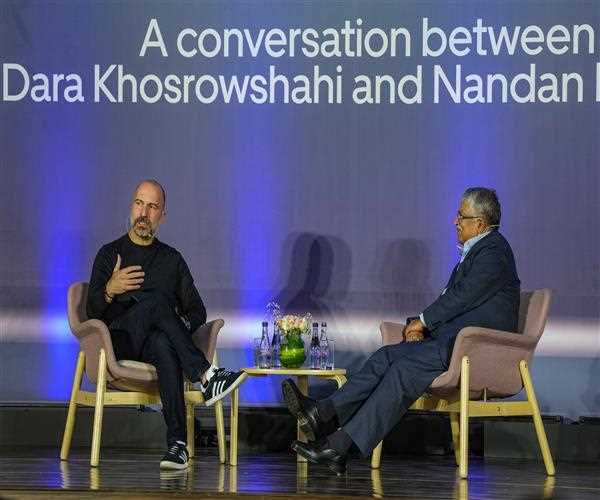
23-Feb-2024 , Updated on 2/24/2024 3:08:25 AM
Uber CEO says "India is the toughest market to succeed in" Why?
From across the board in the Indian corporate world, the bold statement by Uber's CEO, "India is the market where success is the toughest to attain,” rings a bell. It shows just how tough it is to crack the Indian markets and the unmatched opportunities that Uber has got. We will look into the complexities of the above statement and explore the influences of India's diverse culture, rich heritage & uniqueness of its consumer behavior on the country's dynamic industries.
Understanding India's Diverse Market
India is very diverse in its cultures, languages, and traditions and hence, it is the perfect example. From the streets of Mumbai to Kerala's serene villages, India reveals itself in its special way everywhere. Such diversity is also there like markets with all its beauty and challenges for businesses.
India's geographical and cultural diversity brings in different consumer attitudes and behaviors. For instance, the consumption patterns may have a striking dissimilarity in the urban city of Delhi and the rural locale of Rajasthan. Keeping this in mind is vital for businesses that want to operate in Indian markets with the efficiency that they need.
Cultural Heritage as a Guiding Principle
The economic fiber of India remains inextricably linked with its cultural legacy. These behaviors are indeed characterized by a culture of cost-managed, DIY spirit that trickles down into many industries with consumers' purchasing choices. Besides bartering at local markets, the Indians use worthwhile deals to have shrewd spending habits.
This cultural mindset poses several challenges and opportunities for the companies. On one hand, Indian consumers are quite price-sensitive and their buying decisions are value-oriented, which can make the creation of high-value pricing strategies challenging. However, the firms that provide high-quality goods/services at price competitiveness levels have a great opportunity to win in the Indian market.
Legacy of Self-Reliance
The Indian culture is saturated with an old self-sufficient tradition, vibrant with community strength, and naturally-made resilience. The legacy of this value-driven approach is something that Indians continue to care about, they look for such things that are value-driven and consistent with prudent spending.
The idea of self-reliance is rooted in Indian culture dating back to the pre-colonial era characterized by economic self-sustenance and communities living co-dependently. This way of thinking shapes consumer behavior, as more and more Indians take more self-reliance instead of relying on external services or products. Therefore, enterprises need to illustrate the importance and applicability of their products to gain confidence and raise brand recognition among Indian customers.
Praising India's Market Resilience
With the diversity sprinkled across cultural nuances and price sensitivity, but the Indian market still shows a vibrant strength. Among the plenty of sectors that span technology, e-commerce, hotels, and entertainment, industries have grown amidst the intricacies of the Indian markets.
The flexible and rapidly changing consumer landscape of India provides a great area of growth for the business community. In the case of the emergence of digital payments and e-commerce platforms, the retail landscape in India has changed. This enables businesses to go beyond the traditional sales channels and connect with Indian consumers directly. On the other hand, technological advancements and infrastructure growth are the engines for innovation across various sectors that propel Indian growth and market potential.
Unraveling Opportunities in India
Not only restraints but similarly large-scale potentials are evident in this strategically complicated Indian market. Businesses must comprehend and appreciate India's cultural heritage to create products that appease Indian customers.
Hence, companies, like Uber have leveraged the service customization according to the taste of Indian consumers. Uber has managed to effectively exploit India's exploding youth population and growing middle class by providing affordable and convenient transportation means.
The Role of Technology in the Development of Indian Markets
Technology is of paramount significance in the making of the fast-paced Indian market scenario. As digitalization, internet access, and smartphone adoption became more prevalent, e-commerce platforms succeeded in providing customers the convenience of purchasing goods at their fingertips. Digital payment methods have brought a revolution in transactions and changed the digital scenario making the process of adaptation to digital currency imperative. Uber being one of them, has seized this opportunity by simplifying end-user app and moneyless payment alternatives which resonate with India’s tech-literate readership. The country continues to voyage its digital transformation journey and businesses can use this technology to lead the competitive market and open doors to new opportunities.
Conclusion: India's Market Context in Terms of Perspective
In the end, the frank statement of Uber's CEO illustrates the complex nature of the Indian market. Indian cultural values, which were passed on from the past, are a huge contributor to consumer behavior and market trends in the country. The Indian market with all the odds can only mean success for the business that has the shall to continuously innovate.
India's multicultural policies and its cultural identity are the single economic asset that will unleash the underdeveloped market. India’s economic transformation requires that businesses change strategies to accommodate shifting consumer needs, which guarantees a successful nexus with the vibrant mosaic of the Indian market environment.

Content writer
I am a content writter !
Join Our Newsletter
Subscribe to our newsletter to receive emails about new views posts, releases and updates.
Copyright 2010 - 2026 MindStick Software Pvt. Ltd. All Rights Reserved Privacy Policy | Terms & Conditions | Cookie Policy